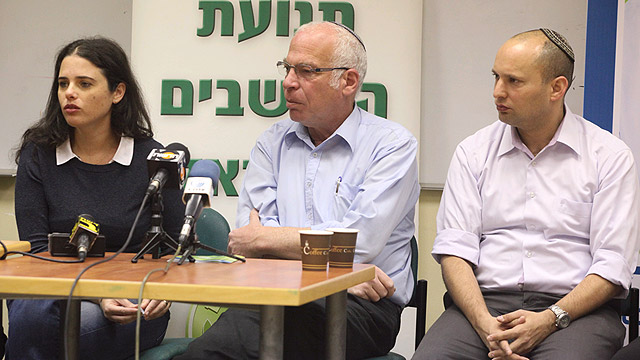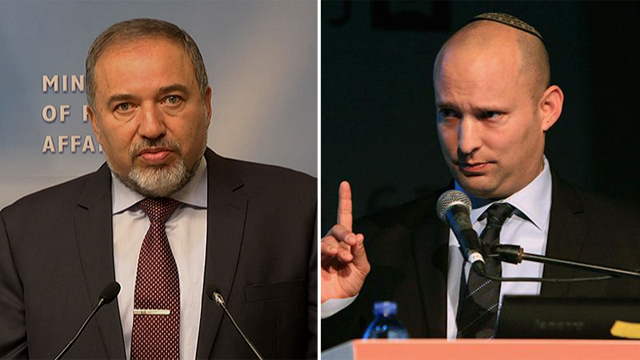

The policy of the new Israeli government is at the center of coalition talks this week, with Bayit Yehudi and Yisrael Beytenu demanding the passage of controversial legislation on capital punishment and Israel's status as the Jewish state.
The Bayit Yehudi party, headed by Naftali Bennett, says it will insist on the passage of the nationality bill and the so-called NGOs bill, while Avigdor Lieberman's Yisrael Beytenu announced it would not give up on the demand to enshrine in law capital punishment for convicted terrorists.
Meanwhile, United Torah Judaism launched talks with Kulanu leader Moshe Kahlon over the composition of the powerful Finance Committee.
President Reuven Rivlin met with representatives of all parties on Sunday and Monday, and is expected to task Prime Minister Benjamin Netanyahu with forming the next government, after 67 MKs recommended the Likud leader. Likud took 30 Knesset seats in last week's elections, six more than its key rival, the Zionist Union.
Central Elections Committee Chairman Salim Joubran will meet with the president Wednesday, to submit the official election results. Netanyahu will likely be called to the President's Residence on the same day for an official ceremony in which Rivlin will ask him to form the government.
Official coalition negotiations can then begin in earnest, and will take place at the Knesset as a cost-saving measure. The talks come ahead of negotiations over ministerial portfolios, which are to officially begin Wednesday.
Unofficial talks began soon after the release of exit polls on Election Day and over the past two days, Likud MKs Yariv Levin and Ze'ev Elkin have held meetings with some of the leaders of the potential coalition partners.
The potential partners agree on most issues - including some of the government's basic tenets - but several issues remain in dispute, including the Foreign Ministry, the Defense Ministry and the chairmanship of the Knesset's Finance Committee.
Netanyahu and Bennett met on Monday for the first time since the elections. While the two did not discuss the portfolios Bayit Yehudi wants in the new government, Bennett presented his party's basic tenets, insisting they be included in those of the new government. Among them is a bill proposal by MK Ayelet Shaked, seeking to impose high taxes on left-wing NGOs, which the Bayit Yehudi claims act against Israel's interests.
Bennett also demanded that the next government completes the legislation for a bill seeking to enshrine Israel as the nation state of the Jewish people, and commits to take a clear right-wing line on diplomatic and defense issues.

When negotiations move their focus to the allocation of the various ministries, Bayit Yehudi will demand an important ministry for Bennett (the defense or foreign portfolios) and two additional ministries for Uri Ariel and Ayelet Shaked. Due to the fact both Yisrael Beytenu and Shas are objecting to a change in the Basic Law: The Government, which limits the amount of ministers to 18, it remains unclear whether Bayit Yehudi can demand three ministries.
Yisrael Beytenu's representatives have stressed that its chairman Avigdor Lieberman will not give up on his demand to take the Defense Ministry. The Likud, however, is interested in keeping the Defense Ministry for incumbent Moshe Ya'alon.
Lieberman himself has repeatedly said that he will not negotiate over ministries before an agreement is made over his party's basic tenets, primarily the death sentence for terrorists.
While Lieberman, the outgoing foreign minister, is fighting for the defense portfolio, Bennett and Likud's Gilad Erdan, Silvan Shalom and Yuval Steinitz are all fighting for the Foreign Ministry. If Lieberman doesn't get the defense portfolio, he expects to remain at the Foreign Ministry.
Kulanu's Yoav Galant and Bayit Yehudi's Shaked are both vying for the Public Security Ministry, while Bayit Yehudi and Shas are fighting over the Religious Services Ministry.

The Justice Ministry, another sough-after post, is being pursued by Likud's Yariv Levin and Benny Begin, and Bayit Yehudi's Bennett, Uri Ariel and Shaked.
Meanwhile, 20 out of the 30 MKs in the largest party in the Knesset, the Likud, demand (or at the very least expect) to be made ministers.
"We have a lot of seats, but the law allows the appointment of just 18 ministers, so Likud will have very few available positions left," a party official said.
"Netanyahu is leaving us in the dark and remaining silent," another party official complained. "He needs to promise us that important ministries will remain in Likud's hands. Meanwhile it seems only one of the three central positions, the defense minister, will stay in Likud's hands - and even that will only happen on a good day."

The two other important ministries are the Foreign Ministry and the Finance Ministry. Likud MKs are angry as it seems more and more likely Netanyahu will give the Foreign Ministry to one of the other parties, after already promising the Finance Ministry to Kulanu's Moshe Kahlon.
Four incumbent Likud ministers - Gilad Erdan, Israel Katz, Silvan Shalom and Yuval Steinitz are all expecting promotions.
Likud's leading women - Miri Regev, Tzipi Hotovely and Gila Gamliel - are all vying for a ministerial position as well. Both Gamliel and Hotovely are gunning for the Education Ministry (as are Likud's Ze'ev Elkin, and Bayit Yehudi's Bennett and Shaked), while Regev wants the Welfare Ministry (as do Likud's Danny Danon and Kulanu's Eli Alaluf).
In an attempt to sew up the Finance Committee, United Torah Judaism leaders Moshe Gafni and Yaakov Litzman have been communicating messages to Kulanu leader Moshe Kahlon, who also wants the committee, promising to promote reforms important to Kahlon without delay if the Kulanu leader gives up the committee, and is appointed finance minister.
"United Torah Judaism doesn't ask much," a part official said. "There aren't many who want the Health Ministry anyway, as for the committee - this is a legitimate request. The goal is to clarify to Kahlon that even if UTJ gets the committee, there will be full cooperation with him and the issues important to him will be promoted without delay."
Yuval Karni, Itamar Eichner and Akiva Novick contributed to this report.
















